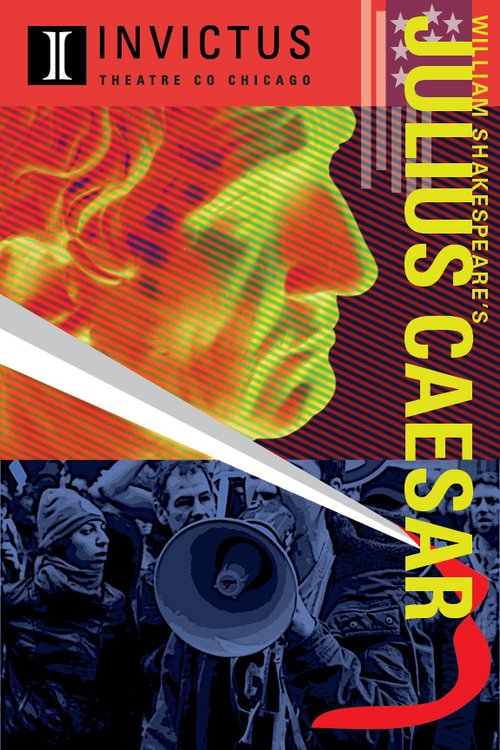
 [rating=3] Invictus Theatre’s production of “Julius Caesar” in modern dress gives us a lot to think about. This unabridged version of Shakespeare’s work contains several embellishments that director and artistic director Charles Askenaizer appended to add to the story’s relevance to the political situation in the United States today. But drawing historical parallels between the decline of democratic rule in Caesar’s day and the uprising of MAGA insurrectionists on January 6, 2021 is somewhat of a stretch. The show looks at various personalities and sequences of events that can enflame ordinary citizens to become vicious and bloodthirsty, with the point being that it is dangerous when mob rule takes over a democratically elected government. I understand what the show was trying to do by examining the precarious times that we live in with reference to the past. Unfortunately, retelling the tale as a parable based on history only goes so far. Too many uneasy and imperfect comparisons are implicitly made between the politics of Ancient Rome and now. Although this production is not as successful as it could have been, what it resolves to do is much more creative and interesting than if the troupe had stuck to Shakespeare’s original story and costuming.
[rating=3] Invictus Theatre’s production of “Julius Caesar” in modern dress gives us a lot to think about. This unabridged version of Shakespeare’s work contains several embellishments that director and artistic director Charles Askenaizer appended to add to the story’s relevance to the political situation in the United States today. But drawing historical parallels between the decline of democratic rule in Caesar’s day and the uprising of MAGA insurrectionists on January 6, 2021 is somewhat of a stretch. The show looks at various personalities and sequences of events that can enflame ordinary citizens to become vicious and bloodthirsty, with the point being that it is dangerous when mob rule takes over a democratically elected government. I understand what the show was trying to do by examining the precarious times that we live in with reference to the past. Unfortunately, retelling the tale as a parable based on history only goes so far. Too many uneasy and imperfect comparisons are implicitly made between the politics of Ancient Rome and now. Although this production is not as successful as it could have been, what it resolves to do is much more creative and interesting than if the troupe had stuck to Shakespeare’s original story and costuming.
In the director’s note in the program, we see how Askenaizer’s aim was to use Shakespeare to discover how mobs of seemingly ordinary people could become so misguided so as to perform violent and heinous acts, only to have these same people radically switch their loyalties in the future. In both Rome and the United States, there are those who fear a cult of personality with regard to the man who is the current ruler of a democratic nation (i.e., Julius Caesar versus Donald Trump) and believe that an ambitious autocrat might go against the larger interests of a State that is ostensibly designed to serve the people’s interests as a whole. Despite these superficial parallels, the implicit comparisons being made in this production don’t really work. Far too many inept analogies are drawn between the events of Ancient Rome and in the United States, making the layering of the politics too muddy. For instance, on January 6, 2021, the insurrectionists’ chant was to “Hang Mike Pence” and President Donald Trump says. “We’re going to walk there—we’re going to walk down to the Capitol—and I’ll be there with you.” This is very different from the plotting that led to the death of Caesar, although both involved premeditated conspiracies. That said, had the insurrectionists succeeded in storming the U.S. Capitol and killing Mike Pence and Nancy Pelosi and other government officials, we could have well faced anarchy. That’s what makes the second act of “Julius Caesar” somewhat prescient of the modern situation and can thus serve as a warning: that the insurrectionists could have plunged our nation into two warlike camps—and ultimately a civil war—as was the case in Rome after Caesar’s death.
Furthermore, the execution of this show falls short of its promise, because an unintended moral relativism has crept into the narrative. This is evinced by my guest observing a political even-handedness, such that it apparently does not take favor either pro- or anti-Trump partisans. She felt that this was a good and necessary thing, considering that our nation is so divisive and roughly half feels strongly one way or the other. In contrast, I found that the absence of a true North Star in the comparisons between the plebeians and the “patriots” to be a failing. Yet despite the differences between my guest and myself in the interpretation of the show, we both agreed that the uses of violence become more normalized as a democratic form of government becomes seemingly more illegitimate and fragile.
The acting in this show is superior. Askenaizer is not only a fine director, but he remarkably plays the chameleon-like and conniving character of Marcus Brutus. Also played to perfection are Julius Caesar (Chuck Munro), Marc Antony (Mikha’el Amin), and Caius Cassius (Daniel Houle). Other characters are played by the following: notably Casca (Joseph Beal), Soothsayer (Colin K. Jones), Portia (Rachel Livingston), Calphurnia (Maria Clara Ospina), Cicero (Gavin Mueller), Flavius (Rick Yaconis), Morellus (Brandon Boler), Cinna the Poet (John Chambers), and Huy Nguyen (Artemidorus) plus Joe Feliciano, Charlie Diaz, and Ryan Cody.
The actors do a nice job on such a small (storefront) stage with a very limited set. Credit must go to scenic and props designer Kevin Rolfs; most prominent are portraits of Caesar on currency plus the U.S. and the “Don’t Tread on Me” flags and all sorts of weaponry, such as knives and modern machine guns. Jay Donley, the intimacy and violence designer, has superbly detailed the murder of Caesar in the first act and Brutus’s death in the second act, not to mention the poking and prodding of various characters by use of flag poles. Lighting by Joe Larkin and sound by Peter Wahlbäck are well accomplished. Text/dialect coach Sarafina Vecchio has gotten the actors to speak in credible Elizabethan English. Most notable is the costume design throughout the show. Emily Bloomer has crafted an conspicuous wardrobe that distinguishes the two opposing sides within Caesar’s Rome: the supposed “pro-Trump MAGA” people, who wear red caps and red ties and later red patches on their camouflage uniforms while in battle, and the “anti-Trump Democrats”, who wear blue ties and later blue patches on their camouflage uniforms. The black hooded slickers are a nice touch, as this is what the Roman conspirators wear when they meet. The number of wardrobe changes in this show is considerable, and they are smoothly carried out due to the assistance of wardrobe supervisor Beau Peterson-Quinn.
While the presentation faithfully portrays Shakespeare’s take on Caesar’s murder and its bloody aftermath, we, as audience members, spend far too much time thinking about which seeming historical parallels make sense and which ones don’t. By the end, we are left with a huge pile of questions—interesting ones, I might add—having to do with present-day politics and how people can be stirred up into taking violent action. Although the show was three-hours long, it was never boring, largely because we are busily trying to digest Shakespeare’s original—both as a historical record and as a portrayal of human nature—while struggling to make the political comparisons work. Had the similarities been closer between the various sets of partisans in Ancient Rome and in the United States of 2022, we might have derived a deeper meaning from what had happened over two thousand years ago. But this wasn’t meant to be. Although it is a worthy endeavor to examine the origins of mob tyranny and explore the motivations of those who make history, this iteration of the story is overly ambitious and tries to accomplish too many things at once. Yet the production has a deep sense of purpose. The bard himself would have been proud!
“Julius Caesar” is playing through November 20, 2022, at the Invictus Theatre Company’s Reginald Vaughn Theater, 1106 W. Thorndale Avenue, in Chicago.
General admission tickets are $35
$30 for students (with valid ID) and seniors.
A three-show subscription is $75.
Performance schedule:
 Mondays 7 p.m.
Mondays 7 p.m.
Thursdays 7 p.m.
Fridays 7 p.m.
Saturdays 7p.m.
Sundays 3p.m.
For more information about the show and the theatre company and to purchase tickets, go to https://www.invictustheatreco.com/.
COVID restrictions are still in effect. You must wear a mask covering your nose and mouth during the whole performance. Click here for more information: https://www.invictustheatreco.com/covid-19-and-ticket-policy.
To see what others are saying, visit www.theatreinchicago.com, go to Review Round-Up and click at “Julius Caesar”.






More Stories
“Throbbin Wood” reviewed by Julia W. Rath
“Royko: The Toughest Man In Chicago” revisited review by Julia W. Rath
“Falsettos”